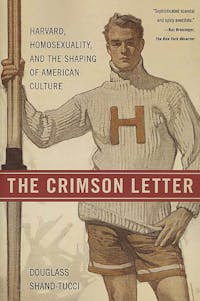The Crimson Letter
Harvard, Homosexuality, and the Shaping of American Culture
 Download image
Download image
ISBN10: 0312330901
ISBN13: 9780312330903
Trade Paperback
432 Pages
$27.99
CA$31.50
In a book deeply impressive in its reach while also deeply embedded in its storied setting, bestselling historian Douglass Shand-Tucci explores the nature and expression of sexual identity at America's oldest university during the years of its greatest influence. The Crimson Letter follows the gay experience at Harvard in the nineteenth and twentieth centuries, focusing upon students, faculty, alumni, and hangers-on who struggled to find their place within the confines of Harvard Yard and in the society outside.
Walt Whitman and Oscar Wilde were the two dominant archetypes for gay students of the later nineteenth century. One was the robust praise-singer of American democracy, embraced at the start of his career by Ralph Waldo Emerson; the other was the Oxford-trained aesthete whose visit to Harvard in 1882 became part of the university's legend and lore, and whose eventual martyrdom was a cautionary tale. Shand-Tucci explores the dramatic and creative oppositions and tensions between the Whitmanic and the Wildean, the warrior poet and the salon dazzler, and demonstrates how they framed the gay experience at Harvard and in the country as a whole.
The core of this book, however, is a portrait of a great university and its community struggling with the full implications of free inquiry. Harvard took very seriously its mission to shape the minds and bodies of its charges, who came from and were expected to perpetuate the nation's elite, yet struggled with the open expression of their sexual identities, which it alternately accepted and anathematized. Harvard believed it could live up to the Oxbridge model, offering a sanctuary worthy of the classical Greek ideals of male association, yet somehow remain true to its legacy of respectable austerity and Puritan self-denial.
The Crimson Letter therefore tells stories of great unhappiness and manacled minds, as well as stories of triumphant intellect and fulfilled promise. Shand-Tucci brilliantly exposes the secrecy and codes that attended the gay experience, showing how their effects could simultaneously thwart and spark creativity. He explores in particular the question of gay sensibility and its effect upon everything from symphonic music to football, set design to statecraft, poetic theory to skyscrapers.
The Crimson Letter combines the learned and the lurid, tragedy and farce, scandal and vindication, and figures of world renown as well as those whose influence extended little farther than Harvard Square. Here is an engrossing account of a university transforming and transformed by those passing through its gates, and of that university's enduring impact on American culture.
Reviews
Praise for The Crimson Letter
"In The Crimson Letter Mr. Shand-Tucci builds on the work of other scholars to describe how gay Harvard men were exposed to a world of learning and artistic achievement. Gay faculty members mentored gay students, gays formed friendships, collaborated and became patrons of the arts . . . Mr. Shand-Tucci says there is an important untold story about the singular environment Harvard provided for gays and how it shaped their later contributions to American culture."—Dinitia Smith, The New York Times
"Harvard's hidden history . . . As Shand-Tucci says 'sex makes fools of us all.'"—Daniel Swift, The New York Times Book Review
"Shand-Tucci demonstrates that many of the people who helped define America developed their genius under the influence of a hemophiliac coterie at Harvard that perpetuated itself to the present day."—Michael Hattersley, Lambda Book Report
"A defiant attempt to show how homosexual [Harvard] has always been and how rich have been the cultural contributions of its homosexuals."—Andrew Holleran, The Gay and Lesbian Review
"Belongs on the same shelf as another book on modern history of American culture, The Metaphysical Club by Louis Menand."—William Rees-Mogg, The Times (London)
"[The Crimson Letter] is nothing less than a re-evaluation of American culture by looking at how it was shaped by Harvard-connected gay men . . . [The book] weaves together history, criticism, and gossip to show how many of the sons of Harvard were not only gay but major culture machers. The material is often fascinating—the discussion of philosopher Lucian Price is a deft examination of American culture and politics."—Publishers Weekly
Reviews from Goodreads
BOOK EXCERPTS
Read an Excerpt
Crimson Letter, The
[ I ]
WARRIOR AND AESTHETE
Charting the Continuum
1.
The Warrior Archetype: Walt Whitman's Harvard
You want to be brothers-in-arms,...


